Article
-
Full Stack Company Guide: Your Path to Modern Solutions 2025
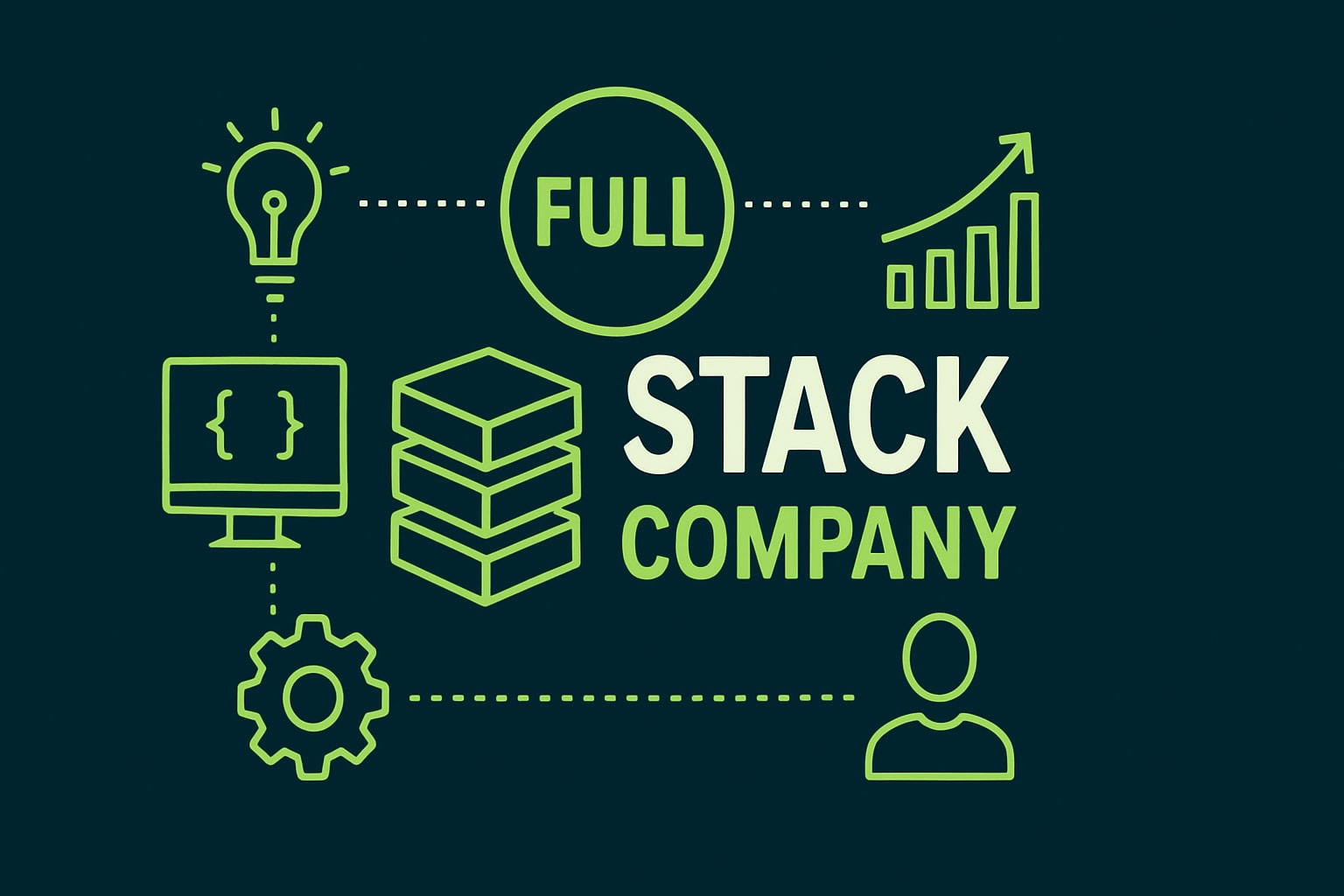
October 23, 2025
The digital world is moving at breakneck speed, reshaping how businesses operate and compete. Every year, new technologies and platforms emerge, making it essential for companies to keep pace or risk falling behind.
In 2025, the ability to adapt quickly is no longer optional, it is a necessity. Organisations that embrace change and invest in the right digital solutions will thrive, while others may struggle to stay relevant.
This guide will demystify what a full stack company is, explore how these innovative firms drive business transformation, and help you choose the perfect partner for your digital journey. We will break down everything you need to know — from defining a full stack company and their core services, to the benefits, engagement process, future technologies, and real-world success stories.
Curious how a full stack company can future-proof your business? Read on and discover the essential steps to unlock modern digital solutions and stay ahead in a rapidly evolving market.
What is a Full Stack Company?
The digital era has given rise to a new breed of technology partner: the full stack company. But what does this actually mean for your business? Let’s break down the concept, explore how these companies are redefining digital transformation in 2025, and discover what sets the leaders apart.
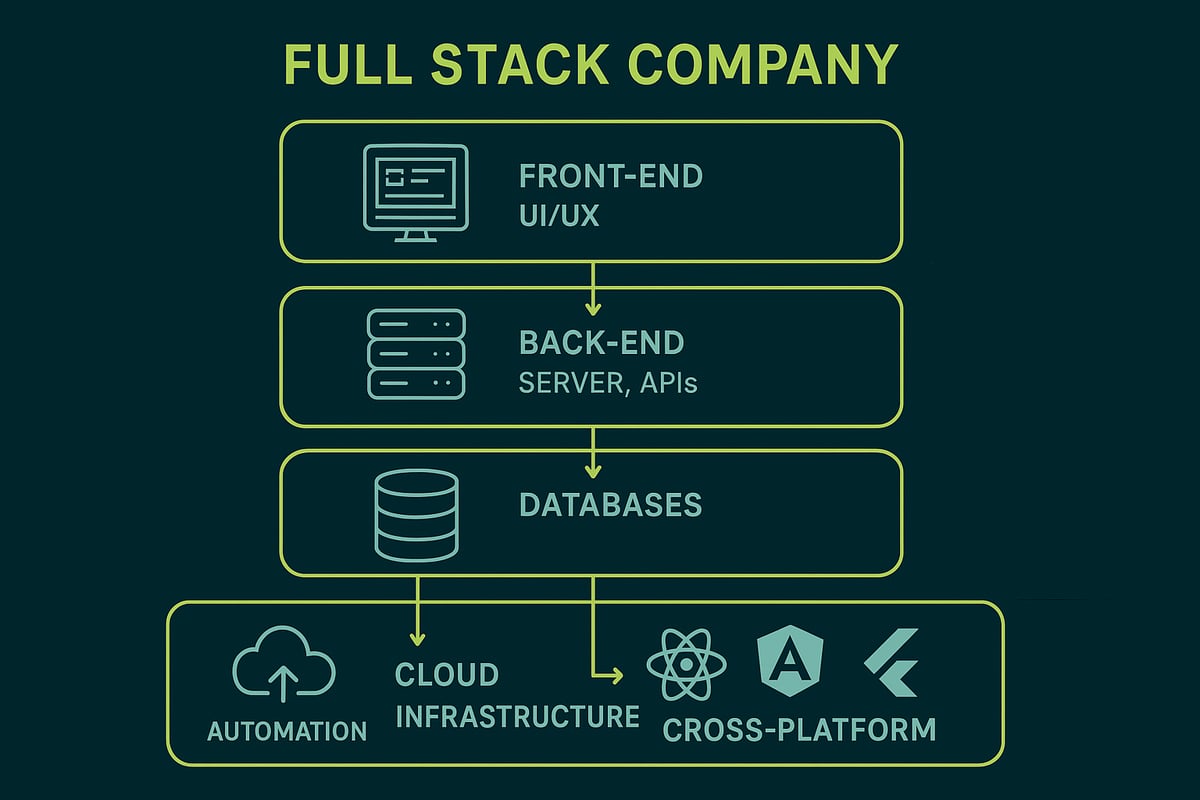
Defining Full Stack Development
A full stack company is an expert in building complete digital solutions, managing every layer of technology from user interface to cloud infrastructure. This means they handle front-end development (what users see and interact with), back-end systems (servers, databases, APIs), and everything in between.
Unlike niche providers who focus on a single technology or platform, a full stack company can deliver web, mobile, and automation solutions under one roof. For example, leading firms build everything from e-commerce shops and mobile apps to workflow automations and cloud integrations.
Here’s a quick comparison:
| Provider Type | Scope of Services | Typical Use Cases |
|---|---|---|
| Niche Provider | Single tech/platform | Only web or only mobile |
| Full Stack Company | End-to-end, cross-platform | Web, mobile, automation, cloud |
The rise of cross-platform development means businesses can now launch products on web and mobile from a single codebase, accelerating delivery and reducing costs. For a deeper dive into this approach, explore these cross-platform app development strategies.
The Role of Full Stack Companies in 2025
In 2025, the full stack company plays a crucial role in helping businesses adapt to rapid market changes. As digital transformation accelerates, companies need to scale fast, deploy new features quickly, and integrate diverse systems.
Full stack companies answer these challenges by offering a single partnership for the entire digital product lifecycle. This approach removes the friction of managing multiple vendors, ensuring a smoother journey from idea to launch.
Competitors like Pulsion and devspiration focus on driving business growth, innovation, and technical excellence. They highlight how a full stack company can help clients future-proof their operations and stay ahead of competitors. Recent industry reports project that demand for full stack solutions will grow by over 20% annually, as more organisations seek agile, all-in-one partners.
Key Characteristics of Leading Full Stack Companies
What sets a full stack company apart from the rest? It’s all about technical versatility, agile teamwork, and a relentless focus on results. Top firms work across the most in-demand frameworks—think React, Angular, .NET, Flutter, and Node.js—plus robust cloud platforms like AWS and Azure.
Successful teams are built on collaboration, clear communication, and strong project management. They adopt agile methods, ensuring projects adapt quickly to changing needs. Ongoing support and proactive optimisation are also vital, so digital products remain secure, scalable, and up-to-date.
You’ll find full stack company success stories across industries. In finance, they’ve built secure banking platforms. In healthcare, they’ve delivered patient portals and automation tools. E-commerce brands rely on them for seamless online shops and integrated logistics systems.
Choosing the right full stack company means finding a partner who delivers technical breadth, strategic insight, and hands-on support for every stage of your digital journey.
Core Services Offered by Full Stack Companies
The digital world is moving fast, and a full stack company is your one-stop partner for building, launching, and evolving digital products. These companies don’t just code—they guide you from idea to launch and beyond, covering every technical and creative step. Let’s break down the essential services you can expect from a leading full stack company, and see what sets them apart in 2025.
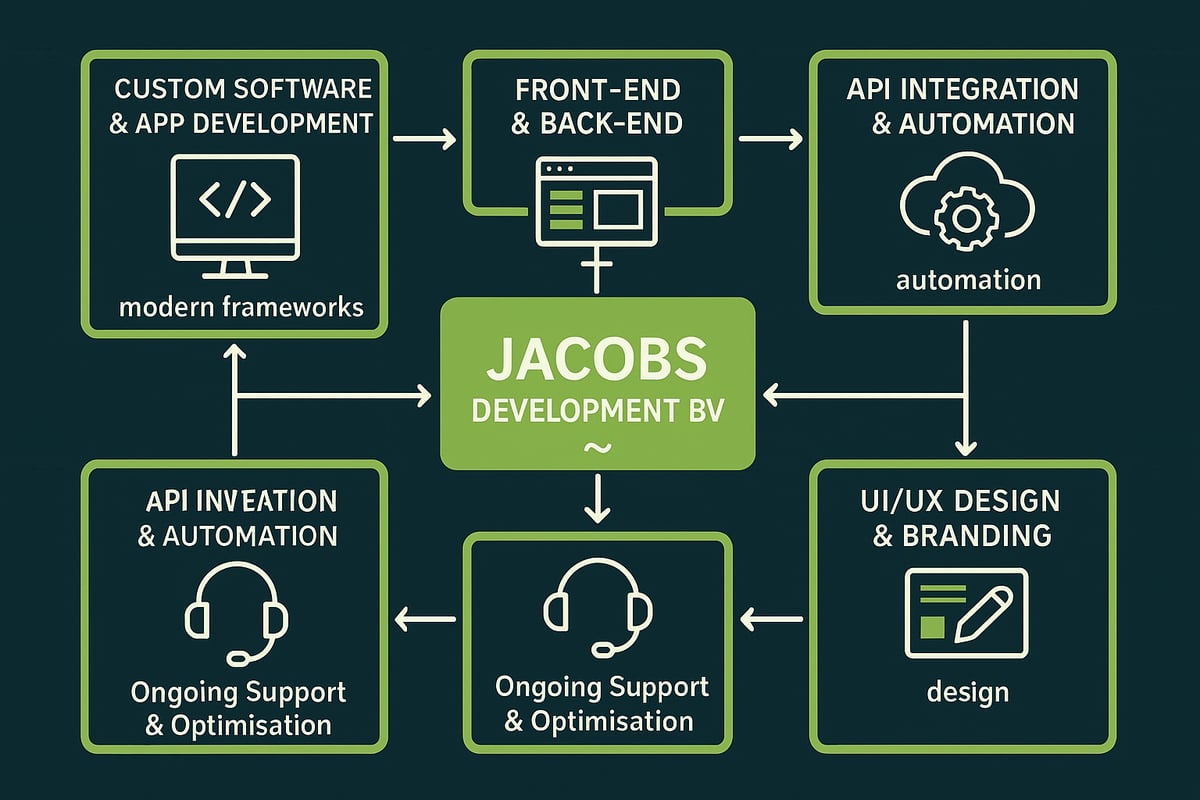
Custom Software and Application Development
A full stack company excels at building bespoke software tailored to your specific goals. Whether you need a dynamic web platform, a mobile app, or a complex internal tool, these experts combine strategy, design, and code for a seamless result. They harness modern technology stacks like MEAN, MERN, LAMP, .NET, Flutter, and Firebase to deliver scalable, future-ready solutions.
What makes a full stack company powerful is the ability to unify back-end logic with intuitive interfaces, ensuring your product is robust and user-friendly. For a deeper look at how these services come together, check out Web and mobile application services for real-world examples and insights.
Front-End and Back-End Development
The heart of a full stack company is its mastery of both front-end and back-end development. On the front end, they design responsive, accessible interfaces that delight users across devices. Technologies such as React, Angular, and Vue.js are standard, enabling interactive and visually appealing experiences.
On the back end, a full stack company ensures smooth data management, security, and integration with databases and APIs. Their teams work with Python, PHP, and Node.js, building the server-side power that keeps your digital products running reliably. This dual expertise reduces friction and speeds up development.
API Integration and Automation
Connecting systems and automating workflows is essential for efficiency in today’s business landscape. A full stack company specialises in custom API development, linking your product with third-party services like Stripe, Google Maps, or GraphQL.
By automating repetitive tasks and enabling real-time data exchange, these firms help you operate smarter. The trend towards AI-driven integrations is growing, with companies embedding intelligent automation to boost productivity and decision-making. This makes your business more agile and data-driven.
Cloud Migration and Hosting
Migrating to the cloud is no longer optional for businesses seeking growth and resilience. A full stack company guides you through this journey, offering expertise in AWS, Azure, and other leading cloud platforms. They handle everything from serverless deployment to climate-neutral, secure hosting.
With cloud migration, your digital products can scale on demand, handle traffic spikes, and remain available around the clock. Managed hosting and ongoing optimisation ensure your systems perform at their best, so you can focus on your core business.
UI/UX Design and Branding
First impressions matter, and a full stack company knows that design is more than just looks—it’s about creating intuitive, memorable experiences. Their UI/UX designers craft wireframes, prototypes, and design systems that reflect your brand and meet user needs.
From branding workshops to usability testing, every step is focused on consistency and clarity. The goal is to turn your vision into a compelling digital presence that stands out in a crowded market. Strong design is the foundation of long-term engagement and loyalty.
Ongoing Support, Maintenance, and Optimisation
Launching a digital product is just the beginning. A full stack company offers continuous support, keeping your software secure, up-to-date, and high-performing. They monitor systems, apply security patches, and develop new features as your business evolves.
Long-term partnerships are key. With proactive optimisation, you avoid costly downtime and stay ahead of competitors. Reliable support means you can adapt quickly to market changes and user feedback, ensuring your product remains relevant.
Jacobs Development BV: A Modern Full Stack Partner
Jacobs Development BV, based in The Hague, stands out as a modern full stack company with a holistic approach. With over 7 years of experience and 35+ completed projects, they serve startups, SMEs, brands, and local governments.
Their services span custom websites and webshops (Webflow, WordPress), cross-platform apps (Flutter, Firebase), workflow automations, branding, hosting, and private AI solutions. Jacobs Development BV is known for deep collaboration, sustainability via green hosting, and GDPR compliance. Example projects like Van Express and EasyStall show their ability to deliver secure, scalable, and innovative digital products.
The Benefits of Partnering with a Full Stack Company
Partnering with a full stack company brings a wealth of advantages to modern businesses in 2025. Whether you are a startup, SME, or established brand, choosing the right partner can dramatically boost your digital trajectory. Let’s break down the key benefits you can expect from working with a full stack company.
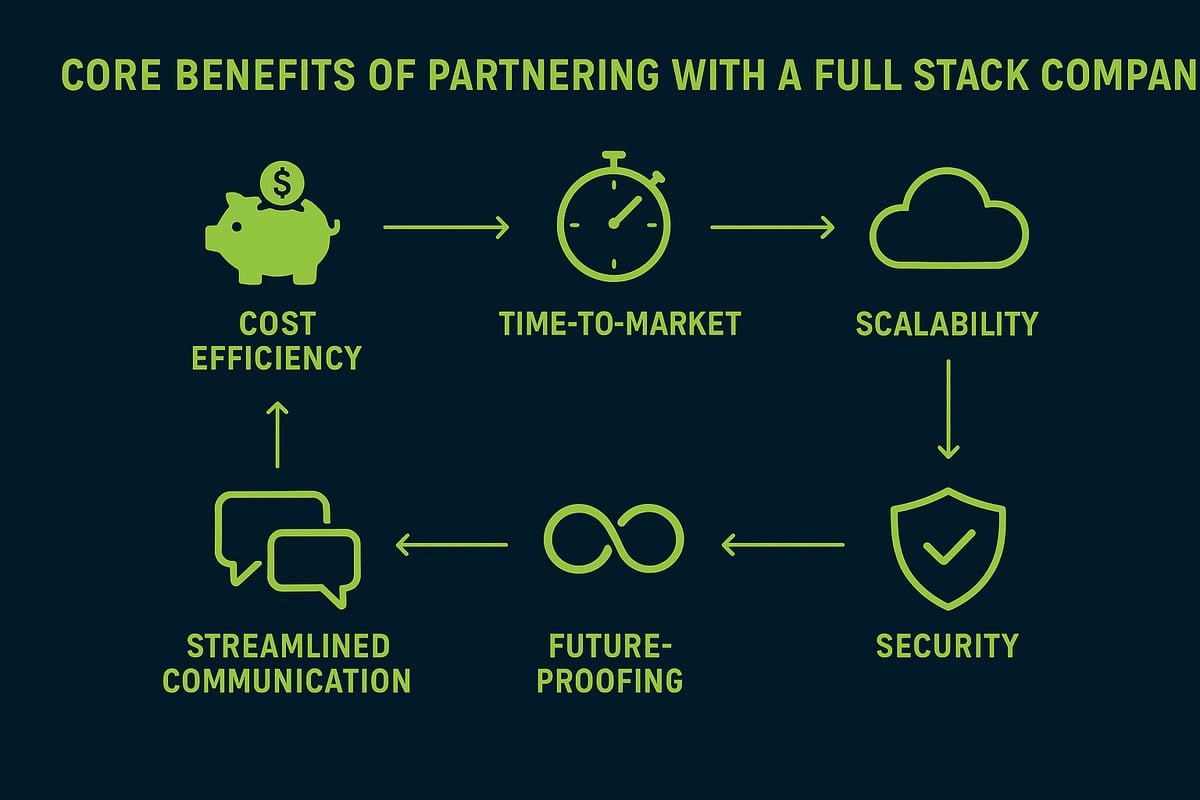
Cost Efficiency and ROI
A full stack company offers significant cost savings by managing every aspect of your digital product in-house. This reduces the need for multiple vendors, minimises costly handovers, and encourages code reuse across platforms. With everything handled under one roof, your budget stretches further.
- Single point of contact reduces management overhead.
- Reusable components lower development and maintenance costs.
- Efficient workflows shorten project timelines.
Businesses consistently report a stronger return on investment when working with a full stack company, as resources are maximised and waste is minimised.
Faster Time-to-Market and Agility
Speed is the new currency of digital business. A full stack company brings together cross-functional teams, agile methodologies, and integrated workflows to accelerate delivery. By removing bottlenecks, your product can launch quickly and adapt easily to user feedback.
- Agile sprints keep progress transparent.
- Integrated design and development reduce delays.
- Immediate responses to changing requirements.
With a full stack company, you can outpace competitors and seize new opportunities as they arise, ensuring your business remains at the forefront.
Scalability and Flexibility
Growth is a natural goal, but it can introduce challenges. A full stack company builds solutions that scale seamlessly as your user base expands or your needs evolve. Cloud migration, modular architecture, and modern deployment methods keep your products flexible.
- Modular systems allow easy feature additions.
- Cloud hosting handles traffic spikes smoothly.
- Architecture adapts to new tools and markets.
Explore Serverless and Edge Computing Trends to see how these approaches boost cost efficiency and scalability, making your full stack company relationship even more valuable.
Enhanced Security and Compliance
Security is paramount, especially for industries like finance and healthcare. A full stack company embeds best practices into every layer of your digital solution, from initial planning to ongoing maintenance. Compliance with regulations such as GDPR is always prioritised.
- Secure coding standards prevent vulnerabilities.
- Regular audits and updates maintain defences.
- Data privacy is built into system design.
By trusting a full stack company, you safeguard your users and reputation against emerging threats.
Comprehensive, Future-Proof Solutions
Technology never stands still, and neither should your digital products. A full stack company ensures your solutions remain relevant through proactive updates, continuous support, and the adoption of emerging technologies.
- Ongoing maintenance keeps systems up to date.
- New features are added as your business grows.
- Modern frameworks prevent obsolescence.
This future-proof approach means your investment keeps paying off, year after year.
Streamlined Communication and Project Management
Having a single, unified team manage your project brings clarity and accountability. A full stack company coordinates every phase, from design through launch, ensuring nothing gets lost in translation.
- Direct communication with your project team.
- Transparent processes and clear timelines.
- Fewer misunderstandings and greater project success.
This streamlined approach simplifies your life and maximises your project’s potential.
Benefit Comparison Table
| Benefit | Description | Impact |
|---|---|---|
| Cost Efficiency & ROI | Lower costs, fewer vendors, code reuse | Higher ROI |
| Faster Time-to-Market | Agile delivery, rapid adaptation | Competitive edge |
| Scalability & Flexibility | Modular, cloud-based, easy to expand | Supports business growth |
| Enhanced Security & Compliance | Secure by design, regulatory alignment | User trust, risk mitigation |
| Future-Proof Solutions | Ongoing updates, modern tech | Long-term relevance |
| Streamlined Communication | One team, clear processes | Project clarity, better outcomes |
The Full Stack Company Engagement Process: Step-by-Step
Choosing the right full stack company is just the beginning. The true value lies in following a proven engagement process that guides your project from first idea to sustained growth. Let’s demystify each step, so you know exactly what to expect when partnering with a full stack company for your digital solution.
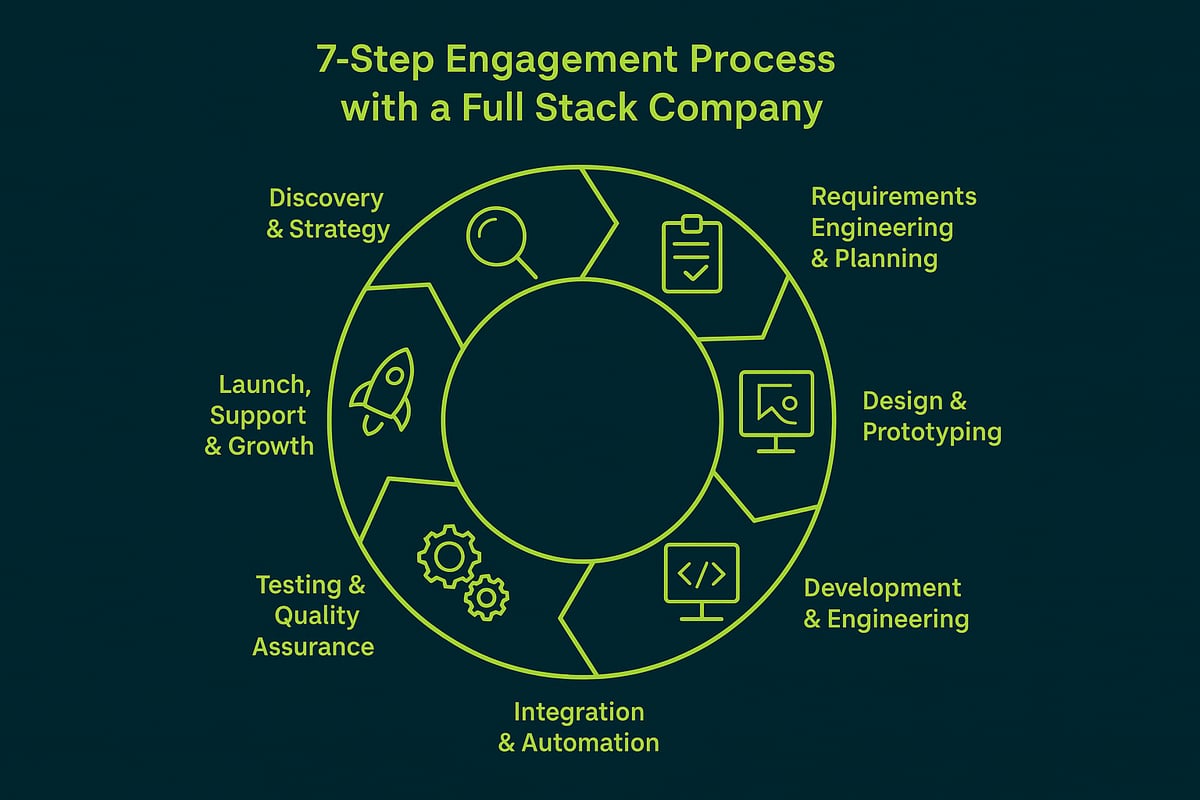
Step 1: Discovery & Strategy
Every successful journey with a full stack company starts with discovery. This step is all about understanding your business goals, target audience, and the challenges you want to solve.
In a typical workshop, the full stack company will ask probing questions. What pain points are you facing? Who are your key users? What does success look like for your brand?
For example, Jacobs Development uses strategy sessions to align on vision, while Pulsion’s discovery phase ensures solutions are tailored to business objectives. At this stage, clear communication sets the foundation for the entire engagement.
Step 2: Requirements Engineering & Planning
Once the direction is clear, the full stack company moves into requirements engineering. Here, every feature, user story, and technical need is mapped out in detail.
Collaborative planning tools come into play. Stakeholders review wireframes, technical specs, and project timelines. devspiration excels at this, breaking down complex systems into manageable components.
A robust plan reduces surprises later. You’ll know exactly what to expect, and the full stack company will be ready to deliver on time and within budget.
Step 3: Design & Prototyping
With requirements in hand, the design team brings your vision to life. The full stack company creates wireframes, clickable prototypes, and visual systems that capture your brand and delight users.
Tools like Figma and Affinity Designer are used to craft user journeys and test concepts early. Accessibility and brand consistency are top priorities.
Jacobs Development’s design-first approach means you see and interact with your product before a single line of code is written. This gives you confidence and room to refine your ideas.
Step 4: Development & Engineering
Now, it’s time for the full stack company’s engineers to get to work. Using frameworks such as React, Angular, .NET, Flutter, Firebase, and Node.js, the team develops both front-end and back-end components.
Agile sprints and regular updates keep you involved. Code reviews ensure quality and maintainability. Whether you need a web app, mobile solution, or complex integration, the full stack company adapts to your needs.
This phase transforms prototypes into working digital products, always with scalability and performance in mind.
Step 5: Integration & Automation
Modern digital solutions rely on seamless connections. The full stack company will integrate APIs, automate workflows, and ensure smooth data flows between systems.
Examples include payment integrations, workflow automations, and custom webhooks. By streamlining operations, the full stack company helps your business run smarter and faster.
This step is crucial for businesses aiming to leverage real-time data or automate repetitive tasks, making your solution truly future-ready.
Step 6: Testing & Quality Assurance
Before launching, every full stack company puts your product through rigorous testing. Both manual and automated QA processes are used to check functionality, performance, security, and compliance.
No product is released until it meets every benchmark. Competitors like Pulsion and devspiration are known for their meticulous QA standards.
Testing not only catches bugs but also ensures your solution delivers a seamless user experience, whether on desktop or mobile.
Step 7: Launch, Support & Growth
The big day arrives. The full stack company manages deployment to live environments, handles hosting, and monitors performance from day one.
But launch is just the beginning. Ongoing support, optimisation, and feature development are all part of the process. Jacobs Development and Pulsion both commit to long-term client success by providing continuous updates and proactive support.
If you want a deeper dive into this journey, check out these successful digital product launches for practical insights and best practices.
With a dedicated partner, your full stack company engagement doesn’t end at launch. It evolves, ensuring your digital product stays relevant and competitive.
Key Technologies and Trends Shaping Full Stack Companies in 2025
The world of digital innovation never stands still. As we approach 2025, the technology stack powering every full stack company is evolving rapidly. New frameworks, smarter automation, and a renewed focus on sustainability are shaping how businesses build, scale, and secure their digital products.
What are the key technologies and trends you need to know to stay ahead? Let’s break them down.
Modern Frameworks and Languages
Every leading full stack company in 2025 relies on a toolkit of powerful frameworks and languages. React, Angular, and Vue.js dominate the front-end, while .NET, Node.js, and Python are the go-to choices for robust back-end development. Flutter and Firebase are empowering cross-platform mobile and web apps, letting teams deliver seamless experiences across devices.
The rise of WebAssembly is bringing near-native performance to browsers, expanding what’s possible for web applications. If you want to see how this is changing the landscape, check out WebAssembly's Impact on Front-End.
Low-code and no-code platforms are also on the rise, enabling faster prototyping and reducing time-to-market. This diversity gives a full stack company the flexibility to choose the best tool for each project.
Cloud and Serverless Architectures
Cloud computing is now the backbone of any modern full stack company. AWS, Azure, and Google Cloud are household names, offering elastic scalability and reliable performance. Serverless architectures are gaining momentum, allowing businesses to run code without managing servers at all.
This shift means companies can scale up for a viral campaign or down to save costs, all in real time. Cloud-native solutions also improve disaster recovery and security, making them essential for mission-critical applications.
AI, Automation, and Data-Driven Solutions
Artificial intelligence is transforming what a full stack company can offer. AI-powered chatbots, predictive analytics, and workflow automation are now standard features. Tools like GitHub Copilot and OpenAI APIs are speeding up development and reducing human error.
If you’re curious about how AI is getting baked into everyday coding and automation, explore this deep dive on AI-Driven Development in Full-Stack. These innovations are allowing companies to build smarter products, automate repetitive tasks, and unlock new insights from data.
Security and Privacy Enhancements
With cyber threats on the rise, every full stack company is doubling down on security. Modern development cycles include robust encryption, secure authentication, and frequent vulnerability testing. GDPR compliance and privacy-first design are now non-negotiable, especially in sectors like finance and healthcare.
By integrating security at every layer, these companies protect both their clients and end users. Ongoing monitoring and quick response to threats are now standard practices.
Sustainability and Green Hosting
Sustainability is no longer a buzzword. Full stack company leaders are investing in climate-neutral and energy-efficient hosting solutions. Green data centres, renewable-powered servers, and carbon offsetting are becoming part of the standard offering.
Many firms now highlight their eco-credentials, appealing to clients who value responsible digital practices. This trend is set to accelerate as more businesses prioritise environmental impact alongside technical performance.
Industry-Specific Innovations
No two industries are the same, and a great full stack company knows how to tailor solutions. In finance, secure banking platforms and real-time analytics are in demand. Healthcare needs compliant patient portals and telemedicine tools. E-commerce thrives on fast, scalable webshops with integrated payment systems.
Energy and public sector projects require robust data integration and smart dashboards. By staying on top of industry trends, full stack companies help clients lead in their market.
Real-World Success Stories: Full Stack Solutions in Action
The true value of a full stack company is revealed when their solutions move from concept to reality. Across industries, these companies are transforming ideas into robust digital products that deliver measurable impact. But what does this look like in practice? Let’s dive into standout projects, real results, and the lessons shaping the next wave of innovation.
Case Studies from Leading Full Stack Companies
A full stack company brings strategy, design, and engineering together, often delivering results that exceed expectations. Take Pulsion, for example. Their digital platform for NHS Scotland streamlined patient engagement, while their work with Innovate UK accelerated innovation for research organisations.
Devspiration’s audit platform, built for a global finance firm, simplified compliance and data management. Their Share Class Management Module improved transparency in investment processes.
Jacobs Development led projects like Van Express, a logistics platform optimising real-time deliveries, and EasyStall, which automated returns for e-commerce businesses. Each project demonstrates how a full stack company can adapt to unique sector challenges, whether in healthcare, transport, or creative industries.
Measurable Outcomes and Client Testimonials
What happens when a full stack company gets it right? The numbers speak volumes. Clients report launch times reduced by up to 40 percent and operational costs dropping by 30 percent thanks to automation and code reuse.
User engagement climbs with seamless experiences, as seen in branding and UI/UX design services from Jacobs Development. For Edu Mediation, a dynamic education brand, their new platform saw a 50 percent increase in online course signups. Wedgeview Music’s creative website boosted artist visibility and fan interaction.
Clients praise the transparent communication, technical expertise, and dedication these companies bring. Collaboration remains at the heart of every successful project, making the difference between a good idea and a market-ready product.
Lessons Learned and Best Practices
Every full stack company project reveals valuable insights. Clear goals, agile teamwork, and ongoing support are non-negotiable. When challenges arise, such as scaling infrastructure or integrating complex systems, agile sprints and rapid prototyping help teams adapt quickly.
A growing trend is the adoption of low-code platforms, which enable faster delivery without sacrificing quality. For businesses seeking rapid results, exploring Low-Code Platforms in Full-Stack Development can be a game-changer. The best results come from blending cutting-edge tech with human-centred design and continuous feedback.
Industry Impact and Future Opportunities
The impact of a full stack company stretches across sectors. In healthcare, digital portals improve patient outcomes. In e-commerce, automation cuts costs and speeds up fulfilment. Energy management tools and fintech solutions are driving efficiency and compliance.
Looking ahead, businesses that partner with a full stack company are positioned to seize new opportunities, from AI-driven automation to sustainable hosting. The future will reward those who prioritise adaptability, collaboration, and innovation in every digital project.
So, after diving into what full stack companies really do and how they’re shaping digital innovation for 2025, you might be wondering how this could look for your business. Imagine having a team by your side that really listens, brings your ideas to life, and supports you long after launch. That’s the power of partnering with experts who’ve seen it all—from custom websites to AI-powered tools and seamless automations. If you’re ready to see how a tailored digital solution can help you grow, why not get a free consultation? Let’s explore your next big step together.
About Jacobs Development
We design and build websites and apps that don’t just look good, but deliver measurable results. From your first idea to launch and beyond, we create solutions that engage your audience and support your growth
More questions? Ask
Jacobs Development
AI
Open a chat with Jacobs Development AI
By submitting a message you agree to our terms of service